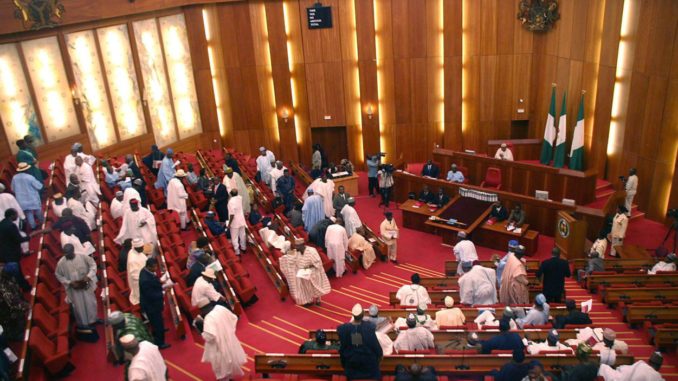
THE tracking of how the so-called constituency projects of the National Assembly members were implemented in 2016 has confirmed the scheme as a massive fraud. The fears are always dismissed by the lawmakers, who always argue that the projects are the best way to bequeath the benefits of governance to the grassroots. The Federal Government had committed N100 billion to the projects within the period under review.
Budget IT, a non-profit, set up in 2011 to promote transparency and accountability in public spending, and arouse civic engagements in budget implementation, had tracked a total of 852 projects. Details of its findings showed that only 40 per cent of them were completed; 41 per cent abandoned; 13 per cent ongoing, while 343 projects were not executed. The locations of 4.8 per cent of the projects were not specified in the budget.
It emphasised, “These projects were signed off and contractors got paid most of the fees… This has been the situation since the inception of Tracka.” In many instances, where the projects were delivered at all, they were dubiously labelled as “donation” from the lawmaker representing the area. In Kebbi State, for example, a lawmaker was involved in such gambit. Projects allocated to his electoral district were worth over N1 billion.
States covered in the BudgetIT monitoring include Akwa Ibom, Cross River, Delta, Edo, Ekiti, Enugu, Imo, Kaduna, Kano, Kebbi and Kogi. Others are Kwara, Gombe , Lagos, Niger, Ogun, Ondo, Oyo, Osun and Sokoto. The situation, without question, will be much the same in the remaining 16 states and the Federal Capital Territory, Abuja.
The racket and other forms of padding have sparked stand-offs annually between the Executive and the Legislative arms of government over budget consideration. In May, it compelled the Vice-President, Yemi Osinbajo, to state unequivocally that it was not within the lawmakers’ purview to insert projects into the budget, when he assented to it as Acting President. Earlier, the Minister of Works, Power and Housing, Babatunde Fashola, had cautioned them to “… avoid the risk of crowded projects…,” which would make implementation difficult. His stance was like putting a pin in their balloon; and they took turns to upbraid each of these two public officials at plenary sessions. In the case of the minister, he had to apologise to stave off legislators’ anger.
Used as pawns in this endless vexatious official corruption are: water boreholes, rural electrification and roads; classrooms; VIP toilets; erosion control sites; primary health care centres; boats and town halls, projects that are more suitable for local governments. For those projects that were executed, they could not have passed through due process, especially feasibility study, design and open bidding, as stipulated in the Public Procurement Act. In 2013, 2,399 of such projects were abandoned, according to the then Minister of Special Duties, Aminu Turaki.
In entrenching this bazaar as part of the country’s budgetary process, the lawmakers not only bicker with the Executive, but also quarrel among themselves. This was the case in the House of Representatives last year, when its erstwhile chairman of the Committee on Appropriation, Abdulmumin Jibrin, was suspended for 180 legislative days. He had dared to spill the beans on how he was pressured by four principal officers of the House to insert N40 billion worth of dubious projects into the budget for their constituencies. “There is a limit to appropriation,” Jubrin lamented.
One year has passed since the Attorney-General of the Federation and Minister of Justice Abubakar Malami, disclosed that his office was compiling names of legislators involved in the racket of ensuring funds disbursement for constituency projects without execution, in order to “take steps in accordance with the law.” Interestingly, the findings of BudgetIT, so far, belie the often repeated claims by the lawmakers that they do not act as contractors for the projects, but are implemented by Ministries, Departments and Agencies. If it had been so, the boats bought with Federal Government’s funds, could not have been labelled “donation” by a lawmaker who purportedly insulated himself from the processes. The same legislator dug a constituency project borehole in his private compound. Had government executed it, it would have been situated at a public square — an ideal place for it — for accessibility to the masses at all times.
These observations are enough for the AGF and the anti-graft agencies to stop foot-dragging on this legislative recklessness and activate legal processes against this abuse of office. Their coyness empowers lawmakers to perpetuate the rip-off. If the country injected N900 billion into the budget between 2004 and 2014 for constituency projects, as the immediate past Senate Leader, Mohammed Ndume, revealed in 2014, in his capacity as the chairman, Senate Committee on Millennium Development Goals, the figure undoubtedly has crossed N1 trillion now. Much of it went into private pockets, going by the dodgy codes that underpin the implementation.
However, one thing stands out: the scheme is a pecuniary design and the projects fall outside the responsibilities contemplated in the 68 Items in the Exclusive Legislative List of the 1999 Constitution. It provides strong grounds for the Federal Government to exploit or seek judicial intervention. Nigeria patterned its presidential system on the United States model. There, lawmakers only lobby government agencies to include projects they want for their constituencies in the federal budget. They do not take over the work of the executive or become emergency contractors to corner budget funds. Nigeria, therefore, should end this brazen fiscal legislative abuse now.
END

Be the first to comment